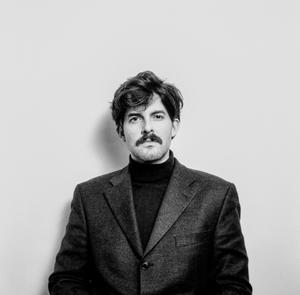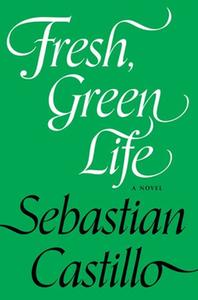
|
|
| photo: Adalena Kavanagh | |
Sebastian Castillo is the author of several books, including SALMON and, most recently, Fresh, Green Life (Soft Skull, June 24, 2025), a blackly humorous tale set on a single snowy night when a young writer attends a New Year's Eve party in hopes of reconnecting with old classmates. Castillo lives in Philadelphia, Pa.
Handsell readers your book in 25 words or less:
It's like if Don Quixote was about watching too many YouTube videos.
On your nightstand now:
I have a big stack right now: Peter Weiss's The Aesthetics of Resistance: Vol. II; The Lord Chandos Letter and Other Writings by Hugo von Hofmannsthal; The Palm-Wine Drinkard by Amos Tutuola; Gerald Murnane's Barley Patch, which I'm rereading for a book club; A Legacy by Sybille Bedford; Go Figure by Rae Armantrout; The Bridge by Hart Crane; Mr. Cogito by Zbigniew Herbert; and God's Ear by Jenny Schwartz, a play recommended to me by a friend.
Favorite book when you were a child:
I didn't read very much as a child. I mostly played video games, practiced the guitar. I had daydreams of being good at skateboarding, which never materialized. I suppose I was a late bloomer compared to some--I didn't become an obsessive reader until my early 20s, though I did read with interest occasionally before then. The first book that really affected me was Tolstoy's The Death of Ivan Ilyich, which I read when I was 16. It convinced me enough that life was not something to waste, though I guess 20 years later the solution to this problem has remained unclear.
Your top five authors:
I find this too impossible, so I'll stick to five writers I've read consistently and loved very much in the last few years: Thomas Bernhard, Javier Marías, Jane Bowles, Robert Glück, Muriel Spark.
Book you've faked reading:
I've never done this. Speaking of childhood, I loved faking sick as a kid. My mother either believed me or didn't have the energy to challenge me on my performances. My junior year of high school I was absent 36 times. One of the biggest regrets in life is that I didn't skip school even more than I did. But now that I'm nearly 40 I think I'm ready to go back; I would be a good student. I would do the reading. Behave.
 Book you're an evangelist for:
Book you're an evangelist for:
A Month in the Country by J.L. Carr. I'm wild on that one.
Book you've bought for the cover:
The Dag Solstad editions from New Directions. And I'm glad I did, as he's become a favorite writer. Rest in peace!
Book you hid from your parents:
The only thing I hid from my mother was a pack of cigarettes.
Book that changed your life:
I read 2666 by Roberto Bolaño when it was first published in English--I was 20 thereabouts--and it certainly changed my life, as it was the book that convinced me to dedicate my life to literature as both a reader and writer.
Favorite line from a book:
I don't often remember lines from books. When I think of a book I've read, I have an image of myself reading it, and if the book was good the image is warm, and I think of my time with it fondly. If I didn't like the book or felt ambivalent toward it, I find it difficult to create this image.
Five books you'll never part with:
Despite my bibliophilia and my overzealous tendency toward book collecting, I don't feel this kind of attachment to any one book I own. Maybe one: I have a signed copy of The Literary Conference by César Aira, which he signed for me when he read in Brooklyn in 2015, which I believe might be the only time he's read in the United States.
I like to tell this story sometimes: at that reading, I sat next to a gruff-spoken, chatty, elderly Black man, who seemed to be interested in speaking with whomever he was sitting next to, though actually he did not speak with me. It dawned on me a little later: this was the jazz pianist Cecil Taylor. Why? Because Aira, many years ago, had written a short story titled "Cecil Taylor," a fictional biography of the musician. And he read it there, that night. Actually, there is a line from that story I do remember, though I've had to look it up:
"...[T]he career of the innovative musician was difficult because, as opposed to the conventional musician, who had only to please an audience, the innovator had to create a new one from scratch, like someone taking a red blood cell and shaping it with patience and love until it's nice and round, then doing the same with another, and attaching it to the first, and so on until he has made a heart, and then all the other organs and bones and muscles and skin and hair, leaving the delicate tunnel of the ear with its anvils and miniature hammers till last.... That was how he might produce the first listener for his music, the origin of his audience, and he would have to repeat the operation hundreds and thousands of times if he wanted to be recognized as a name in the history of music, with the same care every time, because if he got a single cell wrong, a fatal domino effect would bring the whole thing crashing down...."
Afterward, I witnessed Aira kiss Taylor on the hand. When I asked Aira to sign the copy of my book, I told him in Spanish how much his work had meant to me, but as I was saying this, I noticed he was checking out the attractive woman behind me and ignoring my panegyric. I found this moment then and now perfect. I will always love César.
Book you most want to read again for the first time:
In Search of Lost Time by Marcel Proust. And when I reread it in about a decade, it will be the first time I read it, as that book's author would probably say.
Tell us a secret:
I've included the word "clown" in every book I've published and will continue with this practice indefinitely.

